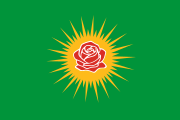Kurdistan Democratic Solution Party
The Kurdistan Democratic Solution Party or PÇDK (Kurdish: Partî Çareserî Dîmukratî Kurdistan), is a political party active in Kurdistan Region, founded in 2002. As a member of the Kurdistan Communities Union (KCK), it is seen as the Iraqi Kurdish branch of the Kurdistan Workers' Party (PKK).[3]
Kurdistan Democratic Solution Party Partî Çareserî Dîmukratî Kurdistan | |
|---|---|
 | |
| Abbreviation | PÇDK |
| Leader | Diyar Garip[1] Necibe Ömer[2] |
| Founded | 2002 |
| Ideology | Communalism Democratic confederalism Jineology Kurdish nationalism Social ecology |
| Political position | Left-wing |
| Regional affiliation | Koma Civakên Kurdistan |
| Colors | Green |
| Seats in the Council of Representatives of Iraq | 0 / 325
|
| Seats in the Kurdistan Region Parliament | 0 / 111
|
| Website | |
| pcdk | |
However, it was never as successful as its siblings, such as the PKK in Turkey and the Democratic Union Party (PYD) in Syria. The Kurdistan Democratic Party (KDP) even closed its headquarters and the party was banned from the Kurdistan Regional Government (KRG), but it continued to operate.[4]
The party contested the 2005[5] and 2009 Kurdistan Region parliamentary elections[6] but failed to win any seats.
The party likewise participated in the parliamentary elections of Kurdistan held on 21 September 2013, winning 3,605 votes (0.18%, no representatives elected). In the approach to the elections the PÇDK had been denied a license to operate due to pressure from Turkey,[7] but in the end they were able to take part in the elections.[5]
On 20 May 2014, members had been taken into custody by security forces of the KDP, the ruling party of Kurdistan Region during operations against diverse organisations in the cities of Erbil, Dohuk, and Zakho. The operations were justified by a prohibition of the party some days before. The reason for the prohibition was a demonstration in front of the KRG's parliament organised by the PÇDK to commemorate the massacre of Erbil in 1997, where 62 members of the PKK were murdered.[8]
Positions and international relations
Positions
As feminism is a part of the party's ideology, it had the highest number of female candidates of all parties in Kurdistan during the parliamentary elections in 2013. According to the director of the election office of the PÇDK, Hassan Judi, it is one of the major goals that women's participation won't be below 50%. In 2013, the party’s list was headed by a woman, Najiba Mahmood.[9]
Even if the party denies that it is a front organisation for the PKK fighters, it admits a shared ideology with them. The central person in the leftist Kurdish movement of the PKK and offshoots is Abdullah Öcalan. Historically a Marxist organisation, the party re-evaluated its ideology with the end of the Soviet Union. Today the party is, amongst other influences, democratic socialist and follows the works of Abdullah Öcalan as the PKK does.[10]
International relations
Although the PKK is seen as a terrorist organisation in the United States, the PÇDK is pro-American. "We used to consider the U.S. as the greatest of all imperialist powers. We were a Marxist organization dedicated to a socialist future. But after the Soviet Union collapsed we began a process of re-evaluating Marxism, and PKK leader Abdullah Ocalan indeed wrote several books on this subject," said the former leader of the party, Fayaq Golpi. He added that "in an era of globalization, you cannot ignore real[i]ties. We then went for democracy and federalism instead. After the liberation of Iraq and the removal of Saddam Hussein, so many things changed-especially the issue of the USA."[10]
The party's relations with Turkey are very negative, since there are many ties between the PKK and the PÇDK. Fearing that the PÇDK could be able to gain power in Kurdistan and turn the land even more into a stronghold of the PKK (the PKK operates mainly in the Kandil mountains and on the front against ISIL), the Turkish government has pushed the KRG to prevent a rise of the PÇDK, which led to the PÇDK being denied licenses during elections[7] and the resolution of the party's headquarters.
The PÇDK for its part accused Turkey and the ruling AKP in a statement at the end of 2011 of planning a massacre of the Kurdish people using chemical and other prohibited weapons and fighting without any ethical principles. The party also claimed that "international communities, institutions and so-called democratic states have been silent in the face of it." They appealed to the Peshmerga forces to accomplish their national duty and protect the Kurds in Turkey from being massacred.[11]
See also
References
- "PÇDK yeni başkanını seçti", Cihan (in Turkish), archived from the original on 25 June 2016, retrieved 21 April 2016
- "PÇDK, Irak Seçimlerinde Demokrat Adayları Destekleyecek". Lêkolîn (in Turkish). 2010-02-21. Retrieved 21 April 2016.
- "Is Turkey crushing Kurdish self-rule in Syria?". Retrieved 20 April 2016.
- "ANALYSIS: Kurds squabble despite Islamic State threat". Retrieved 20 April 2016.
- "Some Political Parties in Iraqi Kurdistan Still Await Licenses". Retrieved 20 April 2016.
- "Ocalan v. Barzani: Two contradictory worlds". Retrieved 20 April 2016.
- Nikolas Xil Carvalho (2014). "Organizoj de la Kurda Liberiga Movado" (in Esperanto). Retrieved 20 April 2016.
- "KDP security forces target KNK, PCDK in Iraqi Kurdistan". Retrieved 21 April 2016.
- "Despite Uneven Playing Field, Women Hope for Greater Wins in Kurdistan Polls". Retrieved 20 April 2016.
- "PKK Popularity Grows in Iraq's Autonomous Kurdistan Region". Retrieved 20 April 2016.
- "PCDK strongly condemns Sirnak Massacre". Retrieved 20 April 2016.